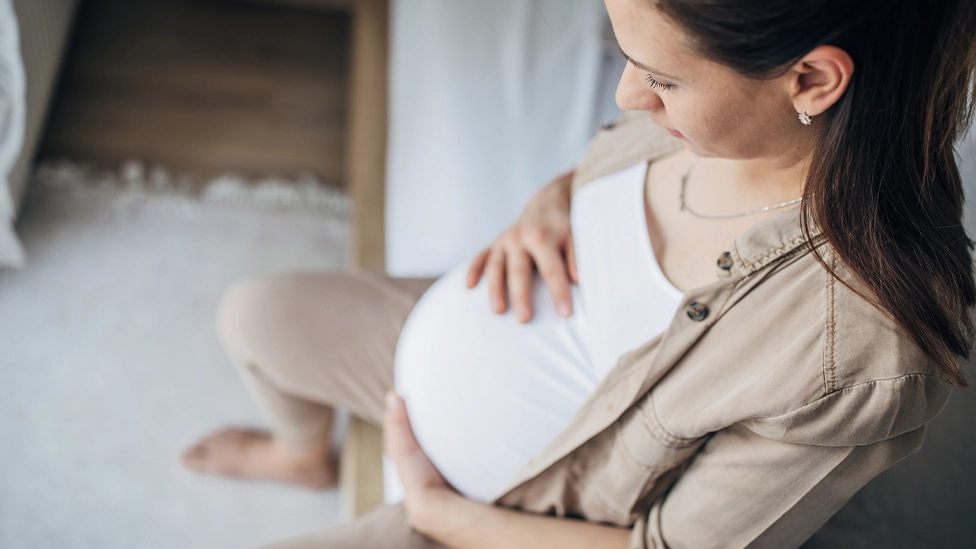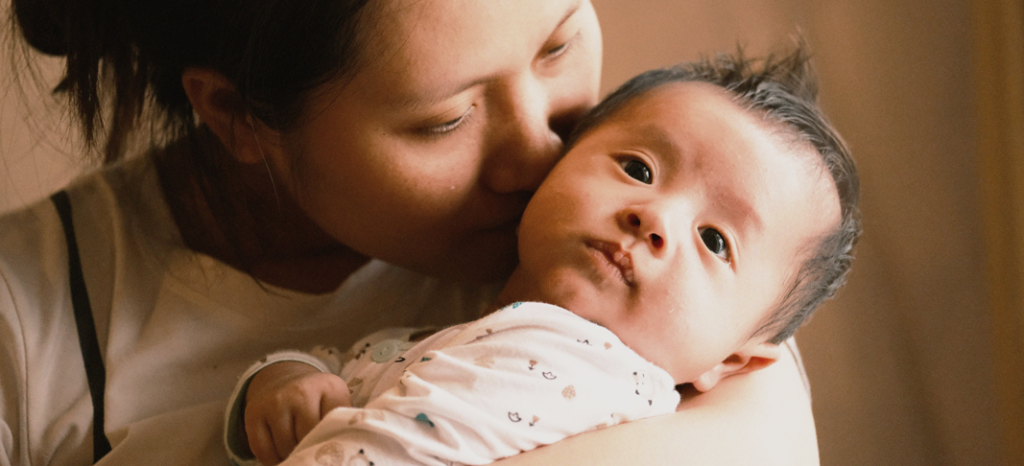The second trimester is often considered the most pleasant stage of pregnancy, but changes that occur in this trimester affect your entire body. Heartburn, frequent urination, and round ligament pain are all common symptoms found in the second trimester. Here are some ways to reduce the common discomforts of the second trimester.
Round ligament pain (belly, hips, and pelvis)
As your baby grows, your uterus expands and extends out of your pelvis. Women have two round ligaments—one each on either side of the uterus—that act as suspenders to elevate and support the uterus in the body.
The increasing size and weight of the uterus as the baby grows causes these ligaments to stretch. This stretching can cause sharp, shooting, or jabbing pain. Round ligament pain commonly occurs while walking or exercising, or at night after a day spent standing or walking.
Here’s how to help reduce pain:
- Resting will often relieve the pain.
- Using a belly band or pregnancy support belt can reduce stress on these ligaments by supporting the back and the uterus.
- Using a pregnancy pillow or placing a pillow under your belly when sleeping on your side can also provide support while you rest.
Heartburn during pregnancy
Pregnancy hormones relax the valve between your stomach and esophagus. This can cause acid reflux or heartburn.
Here are some ways to prevent heartburn:
- Eat small, frequent meals.
- Avoid citrus fruit, chocolate, and spicy or fried food.
- Wait at least 90 minutes before lying down after eating.
- Use an extra pillow for your head when sleeping.
- Drink fluids low in acid, such as water.
- Drink between meals, not at meals.
- When dealing with heartburn, rinse your mouth with 1 cup of water mixed with 1 teaspoon of baking soda.
Frequent urination
If you’re tired of getting up every couple hours with the incessant need to urinate, try these steps:
- Drink less fluid two hours before bedtime.
- Avoid caffeine in coffee, tea, sodas, sport drinks, and energy drinks.
If you have a burning feeling when you urinate, call your health care provider.
Dizziness during pregnancy
Feeling dizzy is fairly common in the second trimester of pregnancy. This can happen because of low blood pressure, and your growing uterus can reduce proper blood flow. To help with light-headedness:
- Eat a small meal every two to three hours to keep yourself energized throughout the day.
- Drink 10 eight-ounce cups of fluid each day.
- Lie down on your left side.
- Change positions slowly, such as from lying to sitting or sitting to standing.
- Sit down to do tasks instead of standing.
- Avoid being in temperature extremes, such as too much sun, cold, or heat.
Contact your healthcare provider if your light-headed symptoms don’t improve.
Nosebleeds during pregnancy
Nosebleeds are more common during pregnancy due to hormonal changes. To stop a nosebleed:
- Squeeze the bridge of your nose gently between your thumb and forefinger for a few minutes.
- Tilt your head forward to avoid swallowing the blood and breathe through your mouth until the bleeding stops.
Contact your healthcare provider if your bleeding is severe or doesn’t improve.
“The second trimester is often considered the most pleasant period of pregnancy, but changes that occur in the second trimester affect your entire body.”
Discolored and itchy skin during pregnancy
You may notice brown patches on your face, darkening of the skin around your nipples, a dark line on your abdomen, and/or stretch marks. These are all common because of hormone changes and shouldn’t be cause for alarm. Use sunscreen to protect your skin, and make sure you keep yourself moisturized.
Itching is also more common on the hands, feet, and abdomen as skin stretches for baby’s growth. To help with itching, use gentle soaps for cleaning, hand washing, and laundry. Hot water can aggravate itching, so take cold or warm showers.
When to call a doctor
There are certain circumstances in which discomforts might escalate into something more serious. Call your healthcare provider if you have any of the following symptoms:
- Abdominal pain or cramps
- Fever
- Vaginal bleeding
- Burning or painful urination
- Concerns about any of your symptoms
Contact us
Have any questions or concerns about the second trimester symptoms? Call CHM’s Maternity Support Team at 1-800-791-6225 for medical and program related support.

What mother in the Bible would you be?
Take our quiz to find out which mother in the Bible you relate to most.




